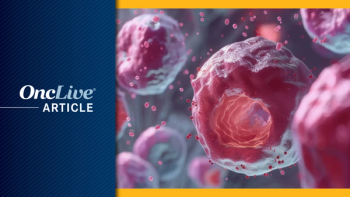
Sotorasib Plus Carboplatin/Pemetrexed Displays Activity, Safety in KRAS G12C+ NSCLC
Treatment with the combination of sotorasib carboplatin, and pemetrexed produced responses and demonstrated safety in patients with KRAS G12C–mutated, advanced non–small cell lung cancer, according to data from the phase 1/2 CodeBreaK 101 trial.
Treatment with the combination of sotorasib (Lumakras) carboplatin, and pemetrexed produced responses and demonstrated safety in patients with KRAS G12C–mutated, advanced non–small cell lung cancer (NSCLC), according to data from the phase 1/2 CodeBreaK 101 trial (NCT04185883) presented at the 2023 IASLC World Conference on Lung Cancer.1
Evaluable patients treated in the frontline setting (n = 20) experienced an overall response rate (ORR) of 65% with a disease control rate (DCR) of 100% (95% CI, 83.2%-100%). The partial response (PR) rate was 65%. Thirty-five percent of patients had stable disease (SD), and no patients experienced progressive disease. Notably, 1 patient in this cohort had an unconfirmed PR at week 6.
Evaluable patients treated in the second-line setting (n = 13) achieved an ORR of 54% and a DCR of 85% (95% CI, 54.6%-98.1%). One patient (8%) experienced a complete response, and 46% of patients had a PR. The rates of SD and progressive disease were 31% and 8%, respectively, and 1 patient was not evaluated for response.
“ORRs were similar across PD-L1 expression levels,” lead study author Jeffrey Melson Clarke, MD, of Duke Health in Durham, North Carolina, explained in a presentation of the data. “With a median follow-up of 3.0 months, preliminary rapid and durable responses were observed.”
Regarding safety, treatment-related adverse effects (TRAEs) were consistent with the known toxicity profiles of sotorasib and platinum doublet–based regimens, and no fatal AEs were reported. The rates of any-grade TRAEs were 92% for patients treated in the frontline setting (n = 25) and 100% for those treated in the second-line setting (n = 13).
In May 2021,
Ongoing studies are examining sotorasib-based combinations for the treatment of patients with KRAS G12C–mutated NSCLC. Notably, data from phase 2 SCARLET study [jRCT2051210086] conducted by the West Japanese Oncology Group that were presented at the 2023 ASCO Annual Meeting showed that sotorasib plus carboplatin and pemetrexed elicited an ORR of 88.9% (80% CI, 78.5-94.8%; 95% CI, 70.8%-97.6%) in patients with KRAS G12C–mutated, advanced nonsquamous NSCLC (n = 27).3
CodeBreaK 101 enrolled patients in the United States and Spain with KRAS G12C–mutated, advanced NSCLC who had measurable disease per RECIST v1.1 criteria, an ECOG performance status of 2 or less, and no active brain metastases.
Patients received 960 mg of oral sotorasib once daily in combination with area under the curve 5 of carboplatin once every 3 weeks for up to 4 cycles and 500 mg/m2 of pemetrexed once every 3 weeks, followed by maintenance sotorasib plus pemetrexed. Data were then pooled and analyzed based on prior therapy in the locally advanced and metastatic settings.
Safety and tolerability, including dose-limiting toxicities, served as the primary end points. Secondary end points included ORR, DCR, duration of response, time to response, overall survival (OS), progression-free survival (PFS), duration of SD, and pharmacokinetics. Notably, PFS and OS data were immature at data cutoff.
The median age was 64 years (range, 46-82) and 67 years (range, 44-74) in the first- and second-line groups, respectively. Forty-eight percent of patients in the first-line group were male, and 62% were male in the second-line group. Moreover, 48% of patients in the first-line group had an ECOG performance status of 0, and 52% of patients had an ECOG performance status 1. Those rates were 54% and 46%, respectively, in the second-line group. The majority of patients in the first-line group (96%) and second-line group (100%) had stage IV disease at screening.
Other key baseline characteristics included a history of brain metastases (first-line group, 16%; second-line group, 23%) prior neoadjuvant/adjuvant chemotherapy (8%; 15%), prior non–neoadjuvant/adjuvant chemotherapy (0%; 46%), and prior anti–PD-1/PD-L1 therapy (0%; 85%).
In the first-line group, 64% of patients had a PD-L1 protein expression of less than 1%, 20% had a PD-L1 protein expression of 1% to 49%, and 12% had a PD-L1 protein expression of at least 50%. Those rates were 31%, 23%, and 46%, respectively, for the second-line group.
Additional safety data showed that grade 3 TRAEs occurred in 48% of patients in the front-line group and 77% of patients in the second-line group. The rates of grade 4 TRAEs were 8% and 15%, respectively.
TRAEs leading to discontinuation of any treatment occurred in 12% of patients in the frontline group and 31% of patients in the second-line group. In the first-line group, the rates of discontinuation of sotorasib, carboplatin, and pemetrexed due to TRAEs were 8%, 4%, and 12%, respectively. Those rates were 15%, 15%, and 23%, respectively, in the second-line group.
The most common any-grade TRAEs reported in all patients included neutropenia/decreased neutrophil count (53%), anemia (39%), and thrombocytopenia/decreased platelet count (37%). Grade 3 or higher TRAEs reported in at least 5% of all patients included neutropenia/decreased neutrophil count (32%), anemia (21%), thrombocytopenia/decreased platelet count (16%), increased alanine transaminase (5%), diarrhea (5%), febrile neutropenia (5%), and nausea (5%).
“Importantly, this study adds to a growing body of data, with the West Japanese Oncology Group results suggesting high response rates and promising clinical activity of the combination,” Clark explained.
The multicenter, randomized, open-label, phase 3 CodeBreaK 202 study (NCT05920356) will evaluate sotorasib in combination with carboplatin and pemetrexed vs pembrolizumab (Keytruda) plus carboplatin and pemetrexed as frontline therapy in patients with PD-L1–negative, KRAS G12C–mutated, advanced nonsquamous NSCLC. The phase 3 study is expected to begin enrollment before the end of 2023.
References
- Clarke JM, Felip E, Li BT, et al. CodeBreaK 101: Safety and efficacy of sotorasib with carboplatin and pemetrexed in KRAS G12C–mutated advanced NSCLC. Presented at: 2023 IASLC World Conference on Lung Cancer; September 9-12, 2023; Singapore, Republic of Singapore. Abstract MA06.
- FDA approves first targeted therapy for lung cancer mutation previously considered resistant to drug therapy. News release. May 28, 2021. Accessed September 26, 2021.
https://www.fda.gov/news-events/press-announcements/fda-approves-first-targeted-therapy - Sakata S, Akamatsu H, Azuma K, et al. The primary endpoint analysis of SCARLET study: A single-arm, phase II study of sotorasib plus carboplatin-pemetrexed in patients with advanced non-squamous, non-small cell lung cancer with KRAS G12C mutation (WJOG14821L). J Clin Oncol. 2023;41(suppl 16):9006. doi:10.1200/JCO.2023.41.16_suppl.9006



































